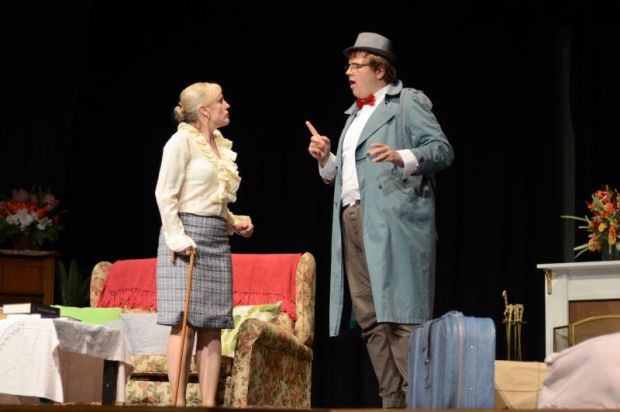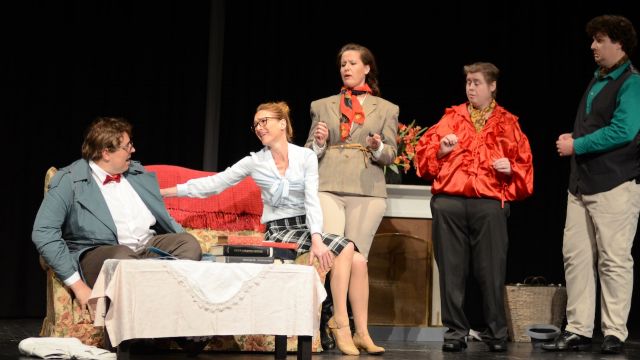The Private Secretary
Adelaide is blessed with several vibrant theatre companies on its margins including Blackwood Players, with most having a strong mandate to entertain their local communities. Each company presents the type of theatre and plays that their audiences both demand and love, and in doing so, provide a niche community resource.
Presenting two shows a year, Blackwood Players proudly claim to be one of the state’s longest running community theatre groups and are notable for supporting their ‘players’ with workshops and opportunities to participate in theatre that may otherwise not be available to actors and aspiring actors. It is these aspects that are particularly relevant for their current production, The Private Secretary. The venue is spacious and welcoming with tables set out cabaret style for an audience of around 60 people. Patrons can bring and buy snacks and food before the show and in the two 20 minute intervals, creating an atmosphere ripe for a fun night out.
The play is an 1883 farce in three acts, by Charles Hawtrey (not from the Carry On films). Adapted from a German comic novel, this version was updated to the 1960s by local author DC White. When the play opened in London, it received poor notices, and so, it is interesting, that this director, Damien White is so passionate about this play. Whilst the main elements of a farce are embedded in the script, they are not consistently delivered in this production. Having said that, a largely local audience were most appreciative on Opening Night.
The Private Secretary revolves around young Douglas Cattermole and his attempts to sow his wild oats in order to please his aunt whom he has never met. In order to do this he pretends to be the new private secretary to his friend Harry’s aunt, travelling to her country house and meeting her daughter and companion. There are of course, the required improbable situations, stereotyped characters, extravagant exaggeration, and violent horseplay included in the script. Missing are the usual slamming farcical doors.

Several of the actors are new to theatre, and whilst they were ‘acting their socks off’, there was little finesse, consistency, and often importantly, volume in the performance of several cast members. The comedy was heavy handed and the ‘double takes’ and ‘breaking of the fourth wall’ to bring the audience into the action, whilst well done by Anita Pipperell as a man hungry spiritualism fan and Deb Jeffries playing char lady, Mrs Stead (sadly only written in for in Act One), was often not delivered as more than a soliloquy by several of the cast.
John Charles Maney, in a lovely old fashioned way, welcomes all patrons and respectfully acknowledges country before morphing back into the character of Douglas Cattermole, somewhat of a wastrel. Maney creates levels of energy, matched by Rebecca Gardener as his aunt, Pipperell and Stead, but appears out of synch and balance with the rest of the cast.
Actors provide their own costumes, in part, suggesting the swinging 60s. There may be benefit in a single coordinator for this. The two different sets were thoughtfully designed, suggesting English rooms for different ‘classes’ in the 1960s. Lighting design by Tim Gladdis is simple, direct and effective. The program is a generous delight, free and full of information about the production and the company. There is an opportunity for this cast to enjoy further workshopping in theatre skills and styles, and undoubtedly, the company has plans for the future to nurture and develop actors and production teams.
The season is only six performances for this show, so pack up your pizza and treats and head for the hills if a warm, welcoming night with new or old friends is your style. Now is when local theatre must be celebrated and The Private Secretary is a local celebration at a very affordable price.
Jude Hines
Subscribe to our E-Newsletter, buy our latest print edition or find a Performing Arts book at Book Nook.

